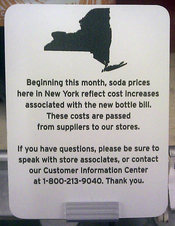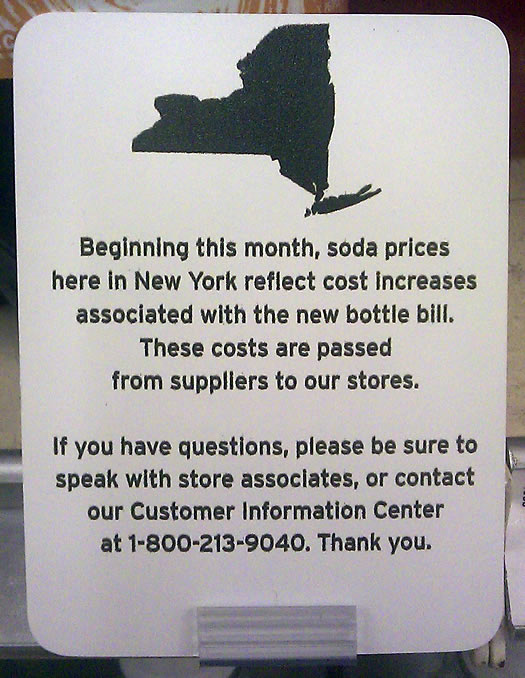The "bigger, better" bottle bill begins
 Steven snapped this photo while shopping at the Latham Hannaford recently (there's a larger pic after the jump). It says:
Steven snapped this photo while shopping at the Latham Hannaford recently (there's a larger pic after the jump). It says:
"Beginning this month, soda prices here in New York reflect cost increases associated with the new bottle bill. These costs are passed from suppliers to our stores."
The bottle bill referenced in the sign is the "Bigger, Better Bottle Bill" that takes effect this week.* The first result of the bill that you'll probably notice is a five cent deposit on bottled water.
But that sign is about soda, which already carried the nickel deposit. So what sort of cost increases are we looking at? We got in touch with Hannaford for details.
Company spokesman Michael Norton replied via email (we've lightly edited his response for formatting and added emphasis):
Here's the background on how the new law impacts items like soda and water (beyond the 5-cent deposit). Distributors will now keep only 20% of unclaimed bottle deposits with 80% going to the New York Department of Taxation and Finance. Under the prior law, distributors had kept 100% of those unclaimed deposits so there's lost revenue to those distributors. No way to say the exact impact on price -- variable and generally it's much less than the 5-cent deposit impact.
Another point -- not to make this more complicated -- the distributors also pay a higher handling fee under the new law. So, it's the twin effect of higher handling fee and the loss of unclaimed bottle deposits that puts some pressure on prices.
Bottom line: at a time when we want to be cutting prices, the added cost to these suppliers could affect price (in addition to the deposit impact).
By they way: beverage companies have kept $2 billion worth of unclaimed bottle deposits since the first bottle bill was enacted in 1982, according to NYPIRG -- the changes to the bottle bill are expected to generate $115 million in new annual revenue for the state. The state Department of Environmental Conservation says the original bill has been a "tremendous success" and helped to significantly reduce litter.
*The law technically took effect on October 31, but WTEN reports that some local outlets won't start collecting the deposits until the end of the grace period on November 8.
(Thanks, Steven!)

Say Something!
We'd really like you to take part in the conversation here at All Over Albany. But we do have a few rules here. Don't worry, they're easy. The first: be kind. The second: treat everyone else with the same respect you'd like to see in return. Cool? Great, post away. Comments are moderated so it might take a little while for your comment to show up. Thanks for being patient.
Comments
hmmm... bought a bottle of water at Stewarts today. Didn't notice whether they charged me the deposit or not...
... said Slacker on Nov 2, 2009 at 4:32 PM | link
Starbucks in Crossgates charged me the deposit on Saturday. Crap - what did I do with that bottle??
... said meierrain on Nov 2, 2009 at 5:18 PM | link
Typical, stupid NY Government. Now NY cities will lose large portions of their recycling revenues, as #1 PET plastic is one of the few plastics that still have profitable scrap value.
... said Common Sense on Nov 2, 2009 at 5:56 PM | link
The handling fee went up about one cent per container, so my $1.50 bottle of Diet Coke at the mini mart should cost me $1.55 including the loss of Coke's windfall profits from lost deposits. For this, they need signs??
... said thisjustin on Nov 3, 2009 at 1:31 AM | link
This is a load of garbage. The prices of soda and water are pegged at what they think people are willing to pay in high volume. Any time the price of a 12 pack can be $5.99 one week, and 4 for $10 the next week, you can't tell me the "handling fees" are going to make a legitimate difference.
... said Mike on Nov 3, 2009 at 12:59 PM | link
I love how New Yorker's aren't falling for the propaganda spewed forth by the distributors and the stores. The fact is that other states have added bottle water, and have had significant changes to their bottle bills that impacted industries cost, but the price of the beverages still remain competitive. It also cracks me up that they are concerned about a loss of revenue from unclaimed deposits!?! The bottle bill was never intended to provide them with a revenue stream. The fact it has since 1982 was just icing on the cake. Well now that icing has all been licked off. Time for them to suck it up.
... said Kelly on Nov 4, 2009 at 2:15 PM | link